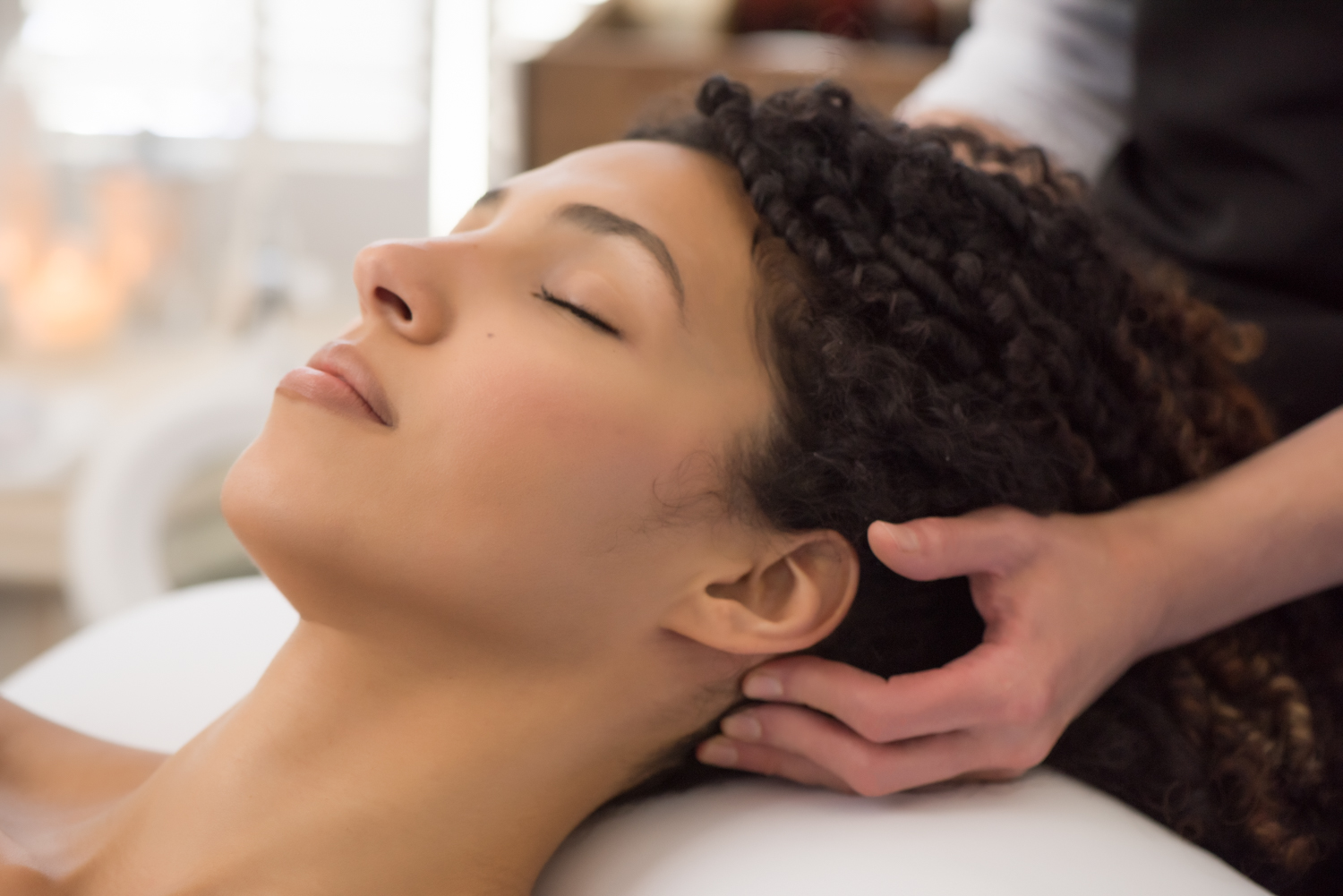When you don’t know: H2O!
Lets talk about what hydrating skin actually means, why we want to do it, and ultimately…how to make sure we do it well! But first, a little science and background!
Years ago, I trained with a Master Esthetician from Europe who gave me this simple, reliable, spot-on-accurate advice: “When in doubt, hydrate.”
Overall, our human bodies are comprised of almost 60% water. Your skin alone is about 64% water! Water is astoundingly powerful both “inside” and “outside”—your entire body is profoundly affected by how much water you drink, and your skin is radically affected by what you do externally to maintain hydration.
Here’s something amazing: hydrating is among the easiest ways to improve the health and appearance of your skin, and one of the most misunderstood and least utilized…that lapse gets corrected right here, and right now.
So…what does “hydrating your skin” actually mean?
Short and sweet: it quite literally means increasing the amount of water held in your skin cells, and this state-of-being solves a host of issues.
Remind me…why do we want hydrated skin exactly?
We want hydrated skin because there is a very long list of improvements we can see when our skin is amply hydrated! Here is just a start…
*Signs of premature aging can decrease;
*Signs of exacerbated aging (such as exaggerated wrinkles) can decrease;
*Excess oiliness can decrease;
*Excess dryness can decrease;
*Sensitivity can decrease;
*Hydrated skin can absorb skin care products (like your serum and moisturizer) better, which can increase the benefits they provide;
*Ample hydration can increase smooth, supple softness (even dewiness), as it “plumps” your skin by increasing the amount of water held by your cells;
*Hydration is such a necessary requirement for your skin that it can help to bring out a fresher, more luminous, healthier glow. (For real!)
Replenishing the skin with hydration is crucial for these benefits to manifest, and we’ll talk specifics and “how-to” in just a moment.
A tiny detour: dry vs. dehydrated skin…
More interesting skin science: most people assume “dehydrated” and “dry” skin are exactly the same. Not true! “Dehydrated” skin refers to a lack of water, while “dry” skin refers to a lack of oil. Your skin can be dehydrated, or your skin can be dry…or your skin can be both dehydrated-and-dry at the same time (or both oily-and-dehydrated at the same time). What a mix! Let’s take a closer look at what those states mean for you and your skin, and what to do about them.
Dehydrated skin is likely to come and go based on numerous factors, one of the biggest being which skin care products you’re using.
In contrast, dry skin is most often considered a chronic skin condition. If you truly have dry skin, it will likely always err on the side of dryness—no matter what climate you’re in, or what products you’re using…although caring well for dry skin (ensuring there is both ample water and oil applied topically in a form the skin can really utilize) provides great improvements.
How to make sure we do have hydrated skin…
Drinking an abundance of water is beneficial in a universal way (it helps with digestion, nutrition intake, circulation, flushing toxins, boosting your immune system…and in some cases can even reduce puffy eyes, dark circles and bloating), but drinking water alone is not enough to fully hydrate your skin. Why?
Well, your skin is the largest organ in your body, and it is the organ farthest away from your body’s circulatory system. Teeny tiny (dinky winky!) capillaries in your skin provide hydration and nutrition from your internal sources. The rest of that hydration must come from external means, chief among them skin care products that hydrate well (and that are not accidently dehydrating your skin).
Here is a simple, general rule to keep in mind: Typically, any skin care product that leaves your skin feeling dried out (and possibly even irritated) is in all likelihood dehydrating your skin. Unless it’s a very purposeful, deliberate exception, none of your daily skin care products should leave your skin feeling dried out or irritated.
Hydrating Products: the Cleanser/Oil Conundrum
A common home care practice that increases the condition of dehydrated skin is very easy to detect: using a cleanser that leaves your skin feeling dry and tight, then lathering on oil as a moisturizer. Why is that a no-no? Any cleanser that leaves your skin feeling dry (especially when your skin did not feel dry to begin with) is absolutely stripping your skin of its natural protective barrier (called your “acid mantle”). This alters your skin’s natural pH level in unhappy ways, leading to the unintended consequence of having skin that’s more sensitive, more vulnerable to bacteria and viruses, more likely to be dehydrated through water loss and drier (through natural oils being stripped away).
If your skin is naturally on the oily side, a drying cleanser will probably put your skin on the awful, daily merry-go-round of dehydration-to-oiliness…skin will feel dry right after cleansing it, then later on will feel extremely oily as your sebaceous (oil) glands go into overdrive, trying to replace what has been stripped away during that cleanse. When you cleanse your skin again, the cycle continues.
If your skin is “dried out” from your cleanser, it will have a harder time absorbing whatever you apply next. Soft, supple, hydrated skin will more readily absorb any product. (This is true for all “dried out” skin, no matter how it arrived at that state.)
Finally, straight oils are simply that: just oil. Because there is no water present when you apply straight oil to dried out skin, nothing is being offered to replenish (re-hydrate). If you’ve tried “solving” dehydrated skin by lathering on heavy moisturizers or oils, you now know why (underneath all that oil) your skin still does not feel hydrated.
How do you know if your skin care products are hydrating your skin?
*Use a cleanser that cleans well but also leaves your skin feeling soft, supple and hydrated. Reliable, hydrating cleanser options here (click).
*Use a high-quality hydrating mist, hydrosol or hydrating toner. Good ones will be flooded with viable, hydration-rich ingredients like aloe, hyaluronic acid, water, botanical waters, etc. Here are some high quality hydrating mist, hydrosol and toner options (click).
* When your skin is moist with your hydrating mist, it is the perfect time to apply your serum (because—and I’ll repeat this often because it’s so crucial—moist, hydrated skin just absorbs product better). Serums address specific issues—choose one that best addresses what your skin needs, such as even more hydration, age prevention, hyperpigmentation prevention, etc. In general, serums that are “straight-up” hydrating are usually in a gel or liquid form, as opposed to an oil or cream form. If you’re not sure if your skin even needs a serum or which serum best serves your skin, check in with your Skin Care Pro; she’ll guide you to the best match. Here are some good serum options (click).
What hydration does for dry skin:
Two words: moisture retention. If you have dry skin, when you follow your hydrating mist and serum with a good moisturizer (and possibly facial oil) you have seriously enhanced the moisture absorption and moisture retention of your skin.
What hydration does for oily skin:
The beauty of balance. If you have oily skin, when you apply a good hydrating mist and hydrating serum, you have helped to calm over-active oil production. You may want to finish with a sebum balancing moisturizer…or, your skin may be nicely balanced without one. Either way, your skin will be more hydrated and therefore, more balanced.
What hydration does for combination and normal skin:
Dewier. Softer. Good? Yes! Normal and combination skin types are not excluded from the hydration benefits! Please enjoy your softer, dewier skin that is more balanced, healthier and less prone to showing signs of aging. Skin that is replete with both hydration (water) and moisture (oil) will look younger longer.
What hydration does for breakout-prone skin:
You definitely can’t have too much of this good thing. Those with breakout-prone skin never need to worry about applying “too much” of a hydrating product. Remember, good hydrating products are water-based, not oil-based, and cannot clog your pores! They can, however, seriously help to balance over-productive sebaceous (oil) glands that nearly always play a part in breakout-prone skin, and this fresh balance helps to pave the way toward clearer skin.
What hydration does for sensitive skin:
Sensitive skin loves getting hydrated! Since dehydration increases sensitivity, we know we must amply hydrate sensitive skin. It’s worth repeating here that dehydrated skin likely has a compromised acid mantle, and any product that dries/dehydrates your skin (leaves your skin feeling “dried out”) is either the cause of or aggravating factor for this issue. This is your clarion call to ensure that all skin care products leave your skin feeling soft, supple and hydrated. Hydration invites your skin to calm down, and is one of the cornerstones of any truly beneficial sensitive skin care regimen.
So now you know (consider yourself a member of the lucky few!) one of the simplest techniques for keeping your skin luscious and flourishing.
Blog written by Marna Herrington with Rich Earth Organic Skin Care Studio
Blog copy editing and polishing provided by Karen-Eileen Gordon (MsGordonLovesWriting@gmail.com)
This blog is not intended to take the place of in-person consultations with qualified skin care and health care practitioners.
This blog is for the purpose of education and fun only. All images and text in this blog are under the legal ownership of Rich Earth Organic Skin Care Studio. Permission is not granted for this text or these images to be copied and used out of the context of this blog, or for commercial purposes. If any part of the text is quoted in an article or other blog for educational purposes, a hyperlink to this page must be included.



